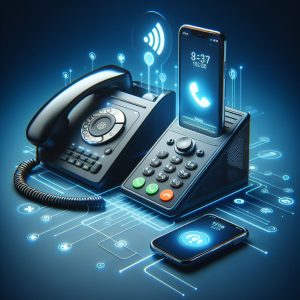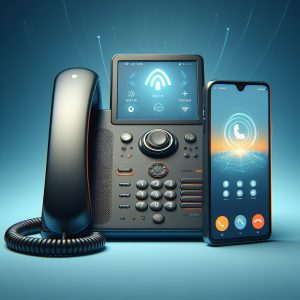I. Introduction
Definition of VoIP Phone Numbers
A VoIP phone number is a digital phone number assigned to a user or business to make and receive calls over a Voice over Internet Protocol (VoIP) phone system. Unlike a regular landline phone number that connects to the analog Public Switched Telephone Network (PSTN), a VoIP number facilitates phone service over a broadband internet connection.
VoIP numbers work by converting a user’s voice into digital packets that are transmitted over the internet, similarly to how data travels over a network. These packets are then converted back into voice signals at the destination phone to enable a two-way call conversation.
VoIP numbers can be purchased from a VoIP provider and are assigned to a user account within the provider’s phone system infrastructure. The user can then make and receive calls to external PSTN numbers or internal extensions using the assigned VoIP number.
Importance of VoIP Phone Numbers for Businesses
VoIP phone numbers are important for modern businesses because they enable moving business phone systems to the cloud and gaining advanced capabilities of VoIP technology. Key benefits include:
- Cost savings – VoIP eliminates per minute long distance charges incurred with traditional landlines. Monthly service fees are also lower.
- Flexibility – Numbers can be instantly added, changed or reassigned as business needs evolve.
- Mobility – Calls to VoIP numbers can ring any device such as cell phones or laptops.
- Productivity – Features like auto attendants, voicemail to email, and call analytics improve operations.
- Scalability – Easily add numbers and inbound call capacity as a business grows.
- Reliability – VoIP providers deliver excellent uptime and redundancy.
VoIP phone numbers facilitate modern cloud-based phone systems that drive efficiency and flexibility gains.

II. Types of VoIP Phone Numbers
There are several types of VoIP phone numbers that businesses can utilize:
Local Phone Numbers
Local phone numbers have an area code and prefix matching a specific geographic region. Local VoIP numbers allow businesses to establish service in regions where they have a physical presence with an office, retail location, or employee base.
A local VoIP number enables customers to contact the business at a familiar local area code instead of a toll-free number. Local numbers builds trust and gives the impression of proximate customer service.
Toll-Free Numbers
Toll-free numbers, such as 800 or 888 numbers, enable customers to call a business free of charge. The business owner pays for the cost of inbound toll-free calls. Toll-free numbers make it easy for customers to reach a company without incurring long distance fees.
VoIP providers can supply toll-free numbers alongside local numbers. Toll-free numbers are ideal for sales, support, reservations or other customer-facing functions.
Virtual Phone Numbers
Virtual phone numbers are not associated with a specific geographic area. A virtual number can have any area code and prefix combination. Virtual numbers provide maximum flexibility when choosing a number for branding purposes.
Businesses use virtual VoIP numbers as corporate main numbers, department numbers, or extensions. Callers are unaware a number is virtual.
International Phone Numbers
VoIP providers can assign phone numbers from many countries around the world. This enables businesses to establish a local presence at international branch offices or serve foreign customers at lower cost.
International numbers help global businesses improve trust and brand recall in foreign markets. Customers abroad can make local calls.
III. How VoIP Phone Numbers Work
VoIP leverages broadband internet connections to transmit calls instead of traditional telephone lines. Here is an overview of how VoIP numbers convert calls and route over the internet:
Conversion of Analog Phone Audio into Digital Data Packets
A microphone on VoIP hardware or software converts inbound voice into digital signals. Voice data is compressed into packets using audio codecs like G.711, G.729 or Opus. Packets receive IP address headers to traverse the internet.
Outbound voice is reconstructed from packets at the destination into analog audio signals that regular phones can interpret. This encoding and decoding happens in near real-time to minimize latency.
Use of Tier-1 Carrier Data Networks for High-Quality Audio
VoIP providers partner with major Tier 1 internet and broadband carriers to transmit call data over fast, reliable networks. Quality of Service controls prioritize voice packets over other traffic.
Dedicated voice packet routes avoid public internet congestion. Fiber optic and SD-WAN underlay reliable transport between VoIP gateways globally for crystal clear call quality.
Additional Features of VoIP Phone Systems
In addition to converting voice to IP packets, VoIP phone systems provide a full-featured business phone experience:
- Auto attendants, IVRs and virtual receptionist capabilities
- Conference calling bringing multiple callers onto one line
- Video calling with modern desk phones and mobile apps
- CRM integrations that display customer records on screen when a known number calls
- Visual voicemail allowing users to select and listen to messages in any order
- Call analytics to monitor call volumes, wait times, abandon rates and other KPIs
- Call recording for quality assurance, training or compliance purposes
IV. Numbering for VoIP Services
VoIP phone numbers are sourced from the global E.164 telephone numbering plan. VoIP providers obtain blocks of numbers to assign to customers.
Existing Number Ranges in the E.164 Numbering Plan
The E.164 standard establishes country codes and number formats enabling global interoperability of the PSTN. These defined number ranges are then allocated to telecom carriers and VoIP operators.
Major number types include:
- Geographic numbers – Linked to a specific region, city or exchange. Prefixes identify location.
- Toll-free numbers – Begin with 800, 888 etc. Customer incurs no cost.
- Premium service numbers – Begin with 900, 976. Calls incur added fees.
- Virtual numbers – No geographic association. Chosen for branding.
VoIP providers obtain number inventory from the following sources:
- Directly from number administration authorities
- Transfers from telecommunication carriers
- Porting numbers from other operators at a customer’s request
Different Types of VoIP Services and Their Implementation
There are a few popular models of VoIP service delivery, each which determine how numbers are utilized:
Business VoIP – Provides a full PBX system over cloud with no hardware. Local/toll-free numbers for inbound calls.
Residential VoIP – Supplies households with local home phone number plus unlimited domestic calling.
VoIP Trunking – Links a private VoIP network with PSTN for inbound/outbound calling via trunk numbers.
Mobile VoIP – Assigns numbers to smartphone apps enabling low cost calling and texting over data.
Auto Dialer – Uses pools of virtual numbers for high volume outbound calling from call centers.
The implementation aligns number types with each service based on needs. For instance, business VoIP typically uses local/toll-free numbers for inbound customer calls.
Options for the Use of Numbers for VoIP Services
VoIP providers have flexibility with how they assign and use numbering:
- Numbers can be designated for inbound, outbound, or both directions.
- The same number can ring multiple endpoints like desk phones and mobile phones to always connect callers.
- Numbers can be switched instantly between users within an organization.
- Additional numbers can be purchased and set up as needed without any delays.
This enables easily tailoring number usage to communication workflows and sales/support processes.
Legal Requirements for a Service and Their Relation to Number Ranges
VoIP providers must comply with relevant regulations regarding phone numbers:
- Rules on transferring numbers between carriers and number changes
- Proper listing of numbers in databases like National Do Not Call Registry
- Limitations on use of certain number ranges like 900 numbers
- Proper attribution of outbound caller ID information
Regulations aim to protect consumers, prevent confusion over ownership of numbers, and deter illegal telemarketing activities. VoIP providers implement careful procedures around onboarding numbers and use cases to ensure compliance. This maintains trust in their services.

V. Benefits of VoIP Phone Numbers
VoIP phone numbers provide many advantages that improve customer experiences as well as internal operations.
Local Presence in Areas Where Customers Are Located
Assigning local numbers matching customer regions builds familiarity and trust. Customers appreciate calling a local number versus a toll-free number. Businesses can set up local numbers in all their service areas.
Improved Call Quality
VoIP leverages modern IP data networks to optimize call quality rather than relying on older PSTN infrastructure. This results in clearer calls free of noise with minimal latency.
Avoidance of Giving Personal Phone Numbers to Clients
VoIP numbers provide a business identity that keeps professionals’ personal numbers private. Dedicated business numbers are more professional for customer communications.
Flexibility and Scalability for Businesses
VoIP numbers can be purchased on demand allowing fast setup of new extensions or departments. Numbers can also move between staff and offices dynamically based on organizational changes.
